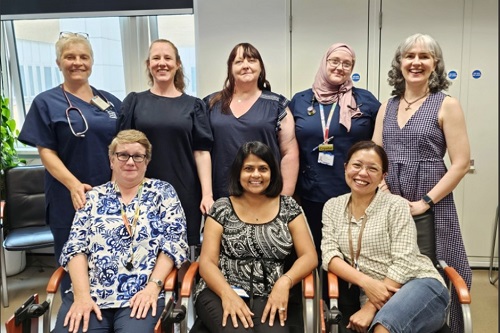Martha's Rule - concerns about a patient's condition
- A patient safety service that allows patients, families, and carers to request a rapid review if they have concerns about a patientís condition.
If you are an inpatient on one of the wards in our hospital, you may see Martha's Rule posters making you and your family or carers aware of the support available to you if there is a noticeable worsening in your condition.
Marthaís Rule is a patient safety critical care initiative from NHS England that allows patients, families, and carers to request a rapid review if they have concerns about a patientís condition.
The initiative is intended to improve communication and responsiveness in hospitals, it was introduced on selected wards from December 2024, with the intention of implementing it across all of our hospital's wards by the end of Spring 2025.
Call directly on our dedicated Martha's Rule line, 24/7: 020 7288 3976*
* Please be aware that we can only support calls regarding people being cared for at Whittington Hospital. If you wish to raise a concern about care at another hospital or NHS Trust, please visit the website for your NHS Trust or contact your hospital's Patient Advice and Liaison (PALS) service for details of whether they operate a similar service.
When should I make a call?
You can call if you are worried that you, or your relative or friend is becoming more unwell despite treatment. In the first instance you should raise your concerns with the ward nurses and doctors.
If you feel that your concerns have not been addressed appropriately or you have any on-going concerns after you have spoken to the ward nurse or doctor, then you should contact make use of the Martha's Rule service.
What things might make me call?
Some changes that you may notice before anyone else:
- The patient seems different to usual (not themselves)
- Breathing differently
- Sweating or unusual skin colour
- Reduced urine output or not passing urine
- More sleepy than usual or confused
- Hands feel cold or very hot
- In pain and looks uncomfortable
- You are worried about their condition
After prioritising the urgency of the problem, the team will visit the ward to discuss your concerns. The Critical Care Outreach Team will liaise with the patientís medical team and instigate treatment or further review if necessary. They will also talk to you about your concerns and let you know what actions they have taken and why.
When should I not make a call?
This service is only for concerns about unwell patients who require an urgent clinical response. For any general concerns, for example, nursing care, facilities or complaints, please speak to the ward nurses or ward manager. You can also contact the matron to discuss any issues further. The nursing staff on the ward can inform you about how you can contact the matron for that ward.
Who else you can contact if you have general comments or concerns
The Patient Advice and Liaison Service (PALS) supports patients, carers and relatives who wish to raise concerns or share compliments. PALS works closely with those who contact them, and our clinical and administrative teams, to ensure concerns are responded to as soon as possible.
The Critical Care Outreach Team

The Critical Care Outreach Team (CCOT) is a nurse led team that supports ward nurses and doctors who are caring for acutely unwell adult inpatients outside of our intensive care unit (ITU). CCOT nurses are senior nurses extensively experienced in the assessment and care of acutely unwell patients.
The CCOT works closely with ITU doctors, who can be asked to review patients, accompany the team on some ward rounds and take referrals overnight.
More about Martha's Rule
The national initiative is named after Martha Mills, a 13-year-old girl who died from sepsis in 2021 after her family raised concerns about her condition.
The initiative has three main components:
- 24/7 rapid review: All staff and patients, families, carers, and advocates can contact a critical care outreach team at any time.
- Daily health information: Clinicians will record daily information about a patientís health directly from them or their families.
- Escalation process: Staff can use the 24/7 escalation process to raise concerns.
You can read more about the initiative on the NHS England website, by clicking here.
Last updated22 Jan 2025

